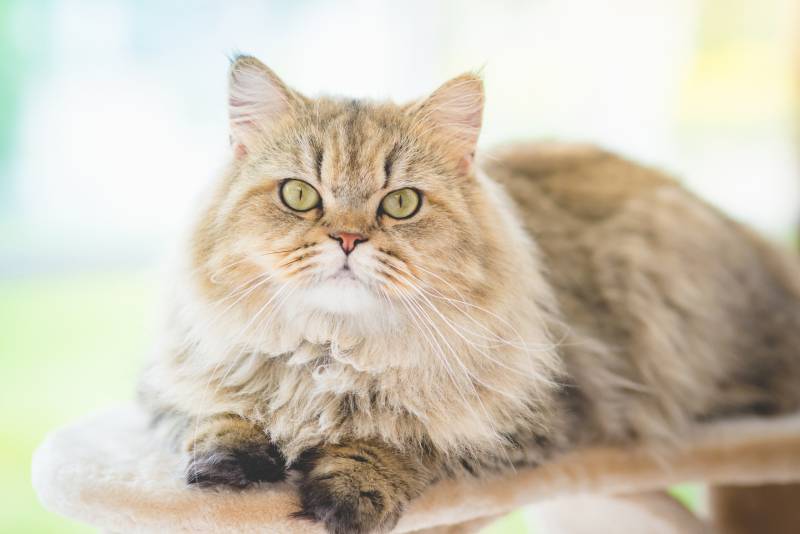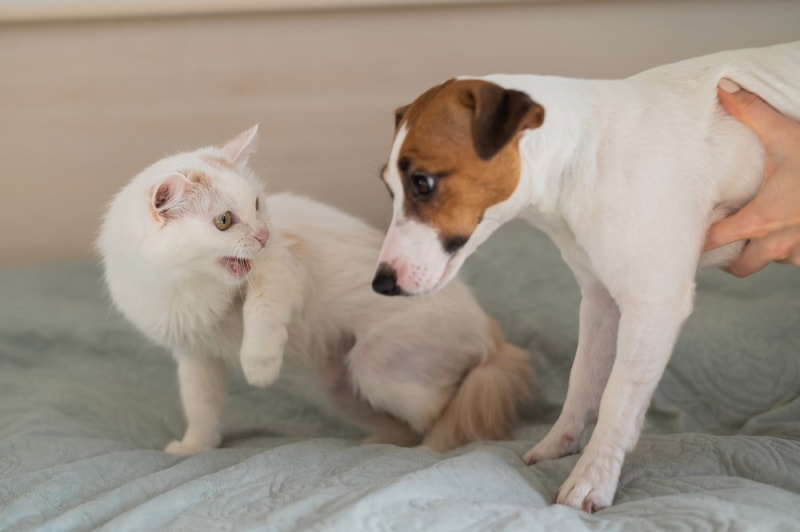Can Cats Eat Rice Krispies? Vet-Reviewed Risks & FAQ

Updated on
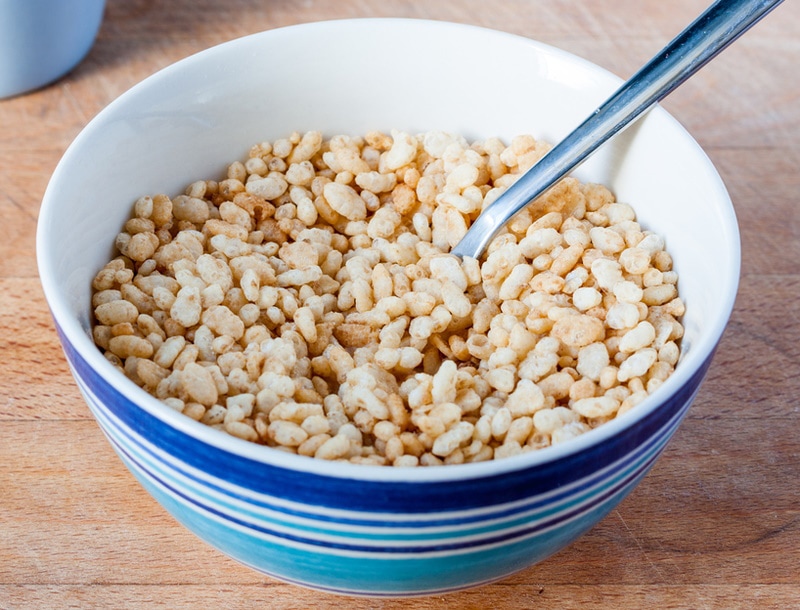
Click to Skip Ahead
It might seem okay to share what you’re eating with your cat, especially if they’re curious about it. But can cats eat Rice Krispies? While they’re not toxic to cats, sharing Rice Krispies with your cat is not a good idea.
Rice Krispies contain sugar, and you should avoid adding them to your cat’s diet. They’re also not nutritionally beneficial for your cat. So, let’s take a closer look into why you shouldn’t feed your cat Rice Krispies and what you can offer them instead.
Are Rice Krispies Unhealthy for Cats?
Just because something isn’t toxic to your cat, it doesn’t mean it’s suitable for them to eat. Rice Krispies are puffed rice and sugar, so are high in carbohydrates. They offer very little in the way of nutritional benefits for your cat, which makes them an unhealthy treat choice. Below, we’ll examine the main ingredients in Rice Krispies and what they provide your cat.
- Rice: Rice is non-toxic and natural, but it contains high levels of carbohydrates, most of which cats do not need.
- Sugar: You should avoid giving your cat sugary food since they don’t need it in their diet. Cats actually can’t even taste sweetness. Excess sugar in their diet can also lead to obesity and the diseases associated with weight gain.
- Salt: While your cat won’t be consuming enough Rice Krispies for salt toxicity to be a problem, it is something to be aware of. Short-term, it can make your cat thirstier than usual.
Cats are obligate carnivores, and they might experience digestive issues after eating Rice Krispies. Cats require high levels of animal-based protein and they don’t require much carbohydrate at all.
Long-Term Risks of Eating Rice Krispies
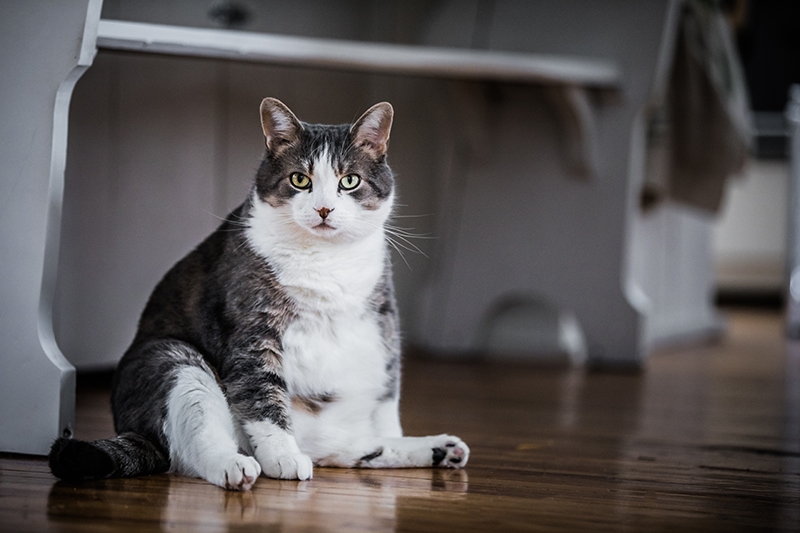
Feeding your cat Rice Krispies repeatedly could result in various health problems that affect not only the quality of their life but also the length of it. Your cat could put on weight due to extra calorie intake, and obesity can result in various other problems, such as:
- Cancer
- Diabetes
- Heart disease
- Hypertension
- Joint problems
- Osteoarthritis
- Skin diseases and allergies
- Urinary problems
What Should You Do if Your Cat Eats Rice Krispies?
While Rice Krispies aren’t considered healthy, they shouldn’t be harmful if your cat scoops up a couple you’ve dropped. It’s important not to intentionally feed them to your cat, but accidents happen and there is unlikely to be a problem if your cat eats a few now and then.
If they eat a large enough amount, they might experience gastrointestinal upset, such as stomach pain or diarrhea. Most cats are also lactose intolerant, so you might worry if there is a little milk on the cereal if it could be harmful. Rest assured, there probably won’t be enough milk on the Rice Krispies to cause any problems, but milk can cause stomach pain, diarrhea, and vomiting if consumed in large amounts.
You’ll mainly find that most cats won’t be too interested in your Rice Krispies, so it should be easy enough to keep them away from your breakfast bowl.

Frequently Asked Questions
What Should Cats Eat?
As obligate carnivores, cats get their protein from animal products. This is essential for their health and development. They require plenty of vitamins and minerals and minimal carbohydrates to be healthy.
Which Human Foods Can You Feed Your Cat?
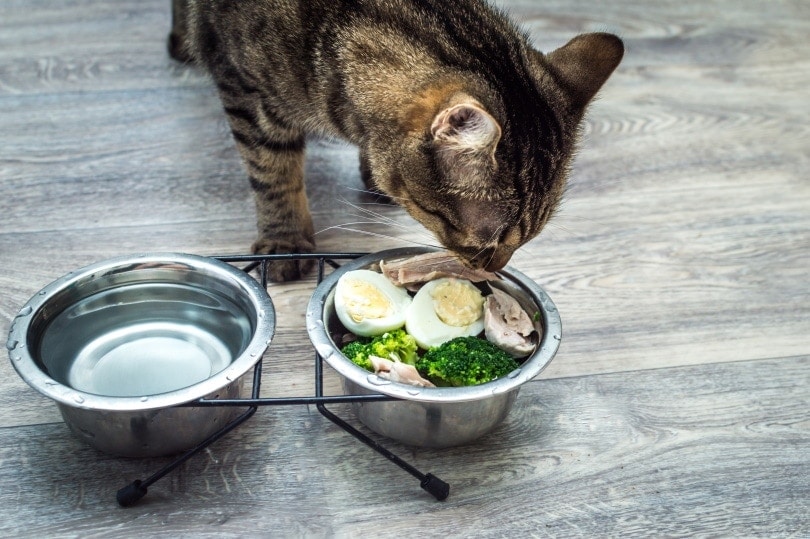
Your cat will get all their nutrition from their regular diet as long as it is a high-quality feline diet that is appropriate for your cat’s age and health status. You can give them nutritional boosts through treats, but they should never replace their regular food.
Human food your cat can safely enjoy in moderation includes:
- Cooked, plain meats (such as chicken, beef, and turkey)
- Eggs (scrambled or boiled)
- Fish – oily fish e.g mackerel contains fish oils that are beneficial for your cat
- Fruits (such as bananas, seedless watermelon, pumpkin, cantaloupe, blueberries, and peeled and de-seeded apples)
- Vegetables (such as carrots, cucumber, peas, asparagus, and steamed broccoli)
Which Human Foods Should Cats Avoid?
Unlike Rice Krispies, some human foods aren’t just considered unhealthy choices but are harmful or poisonous to your cat. Examples of these include:
- Alcohol or food containing alcohol
- Chocolate
- Coconut milk
- Coffee (or anything with caffeine, this includes tea)
- Cooked bones
- Dairy
- Foods in the allium family (such as onions, garlic, leeks, chives, scallions, and shallots)
- Grapes and raisins
- Nuts (especially walnuts and macadamia nuts)
- Raw fish and meats
- Raw bread dough
- Seeds
Final Thoughts
Rice Krispies aren’t harmful in the short term, but they aren’t a suitable snack for your cat since they don’t offer any nutritional benefits. In the long-term, Rice Krispies can cause health problems.
If your cat accidentally eats Rice Krispies, they should be fine; at most, you might notice some digestive problems such as diarrhea. If you notice any significant signs of discomfort, contact your veterinarian.
Featured Image Credit: timages, Shutterstock


